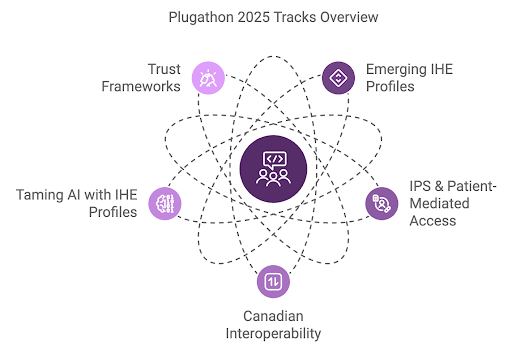|
Day 1
|
|
Track 1:
Emerging IHE Profiles
|
Track 2:
IPS & Patient-Mediated Access
|
Track 3:
Advancing the Pan-Canadian Shared Interoperability
|
Track 4:
Taming AI with IHE Profiles
|
Track 5:
Trust Frameworks and IHE as their Technical Enabler:
|
|
The Emerging Profiles track is highlighting and testing new and newly published Profiles for IT Infrastructure, Devices and Imaging. Participants will collaborate with us to help clarify, refine and gain adoption of these profiles in future implementations.
|
Discover how IPS empowers patients with control over their health data and enables secure information exchange, while contributing your insights to the evolution of this critical standard.
|
Collaborate with Canadian architects and standards experts to develop standards addressing key national interoperability challenges, with the potential for these profiles to evolve into international specifications. Your expertise will directly influence the future of healthcare interoperability in Canada.
Pan-Canadian Patient Summary (PS-CA) will be incorporated into the IPS Track.
For content details click here: Here
|
Participate in shaping the future of AI interoperability in healthcare by exploring how IHE profiles can be used to standardize and improve AI integration. Contribute your expertise to the development of robust standards that ensure patient safety, effective caregiver experience, and responsible AI implementation.
|
Understand the crucial role of IHE profiles in establishing trusted health information exchange within broader trust frameworks, enhancing security and reliability. Contribute to the ongoing development of these frameworks and help shape the future of secure health information exchange.
|
|
8:30 - 10:00 am
SDPi Gemini project introduction
Speaker:
|
8:30 - 9:00
Welcome to the IPS & Patient-Mediated Access Track
Speaker:
- Allana Cameron, Senior Product Manager (PS-CA), Canada Health Infoway and Track Lead
9:00 - 10:00
IPS: Patient-Mediated Access and Verifiable Health Links
Speakers:
- Carl Leitner, Technical Officer, WHO
- Monief Eid, Enterprise Imaging & eHealth Senior Consultant
|
8:30 - 9:15
Pan-Canadian Digital Health Interoperability Roadmap Highlights and Insights
Speaker:
- Andrew Liu, Senior Director, Architecture & Development, Canada Health Infoway
9:15 - 9:45
CA Core+ Overview
Speakers:
- Ken Sinn, Senior Standards Specialist, Canada Health Infoway
- Vineeth Sekharan, Senior Business Analyst, Canada Health Infoway
|
8:30 - 10:00
AI in Medical Imaging
Intro to AI in Imaging
- White paper
- AIR
- AIW-I
- IRA
- AIRAI
Speakers:
- Kevin O’Donnell, Sr. R&D Mgr at Canon Medical Research
- Kinson Ho, Engineer, Tempus
- Antje Schroeder, Manager Healthcare IT Standards, Siemens Healthineers
|
8:30 - 10:00
Framing the problem:
Introduction and Discovery
Speaker:
- Attila Farkas, Canada Health Infoway
|
|
|
Break
|
|
10:30 - 12:00
SDPi project Testing
(Work Session)
|
10:30 - 12:00
Joint Session: IPS will join Track 5 - Trust Frameworks and IHE as their Technical Enabler
|
10:30 - 12:00
CA Core+: Testing Prep + Systems Testing
Speakers:
- Ken Sinn, Senior Standards Specialist, Canada Health Infoway
- Vineeth Sekharan, Senior Business Analyst, Canada Health Infoway
|
10:30 - 12:00
AI in Medical Imaging
- What/where are the pain points? (Group Discussion)
- Talking about the problems
- Explore potential ways to address
Speaker:
- Kevin O’Donnell, Sr. R&D Mgr at Canon Medical Research
|
10:30 - 12:00
Lived Experiences: Building Trust into Shareable Health Links: Next Steps in Verifiable Health Links
Speakers:
- Carl Leitner, WHO - GDHCN
- David Pyke/Didi Davis, ONC / TEFCA
(Joint Session with IPS)
|
|
Lunch
|
|
1:30 - 3:00
Intro to Scheduling for Mobile
Speaker:
- Matt Blackmon, Standards and Conformance Testing Programs Manager, The Sequoia Project
|
1:30 - 3:00
International Insights: Successful IPS Deployments, including presentations from around the globe
1:30 - 2:00
Patient-mediated Access in New Brunswick, Canada
Speaker:
- Pat Kerry, Chief Technology Officer, VeroSource Solutions
2:00 - 3:00
Patient-mediated Access in Brazil and Overview of LACPass
Speakers:
- Blanda Helena de Mello, Interoperability Technical Consultant. DATASUS
- Carlos Núñez, Regional Technical Coordinator, RACSEL
|
1:30 - 3:00
CA Core+: Gap Analysis and Next Steps
Speakers:
- Ken Sinn, Senior Standards Specialist, Canada Health Infoway
- Vineeth Sekharan, Senior Business Analyst, Canada Health Infoway
(Pan-Canadian Patient Summary Demo will occur in IPS track)
|
1:30 - 3:00
Using AI for Imaging – Tooling
- NVIDIA NIMS Introduction
- Group Workshop
Speaker:
- Brad Genereaux, Global Lead Healthcare Alliances @ NVIDIA
|
1:30 - 3:00
Lived experiences
Speakers:
- Toni Darouze, Health Canada
- TBC, Canada Health Infoway
- Alexander Berler,
Jürgen Brandstätter
|
|
|
Break
|
|
3:30 - 5:00
Intro to Finance & Insurance
Speaker:
- Matt Blackmon, Standards and Conformance Testing Programs Manager, The Sequoia Project
|
3:30 - 4:15
Enhancing IPS Data Quality: Automated Extraction and Standardization of Clinical Concepts
Speakers:
- Martin Persaud, Director, AI & Technology Transformation, Verto Health
- Ivana Marzura, Vice President, Product, Verto Health
4:15 - 5:00
From Experience to Improvement: Patient and Provider Insights on Sharing Health Data
Speakers:
- Anne Baldwin, Director, Change Management & Adoption, Canada Health Infoway (Moderator)
- Dr. Paula Voorheis, Postdoctoral Fellow at the Science of Care Institute, Sinai Health System
- Lillian Ly, Executive Director, Programs & Chief Digital Information Officer, eHealth Saskatchewan
- Bobby Gheorghiu, Senior Director, Research and Analytics • Performance, Canada Health Infoway
|
3:30 - 5:00
CA:FeX: Crafting Regulated APIs
Speaker:
- Edmond Chiu, Senior Software Developer, Canada Health Infoway
|
3:30 - 5:00
Using AI for Imaging – Tooling
Speaker:
- Brad Genereaux - Global Lead Healthcare Alliances @ NVIDIA
|
3:30 - 5:00
Lived experiences
- South America
- Australia
- Middle East
Speakers:
- Carlos Núñez, Regional Technical Coordinator, RACSEL
- Ryan Mavin, Executive Branch Manager Connected Care, Australian Digital Health Agency
- Monief Eid, eHealth and Enterprise Imaging Senior Consultant at Ministry of Health Saudi Arabia
|


